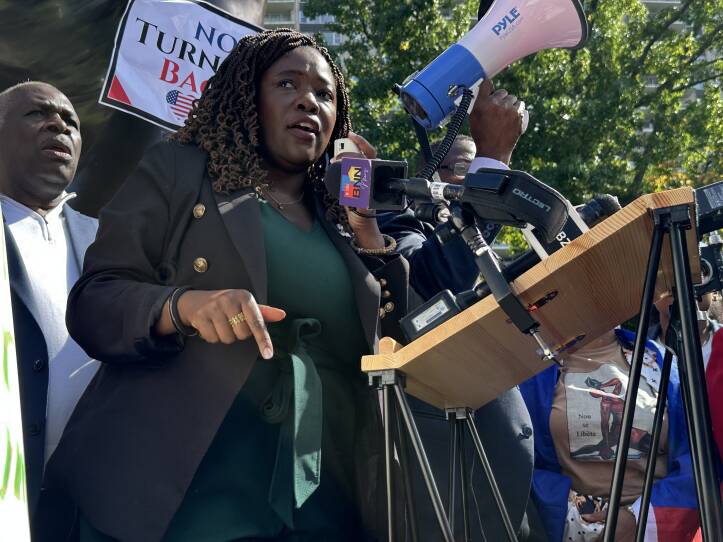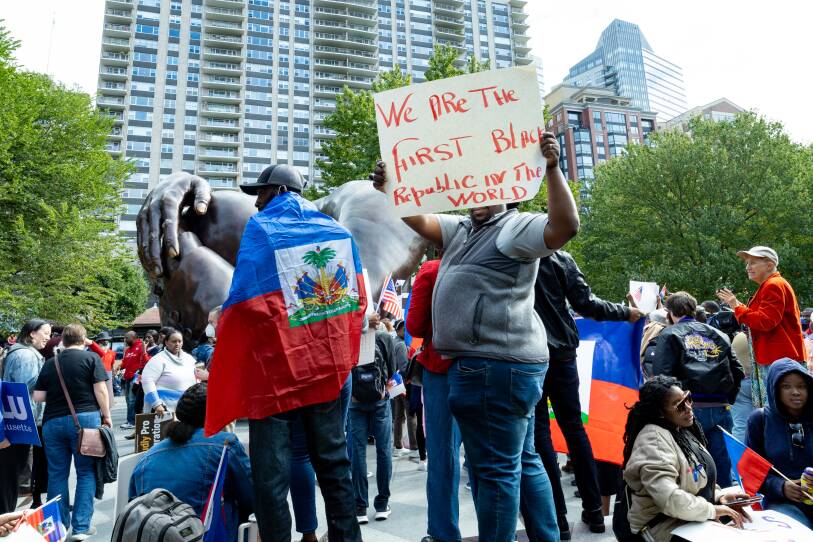Hundreds of Haitians and their allies gathered on Boston Common Tuesday to protest the racist lies being perpetuated by presidential nominee Donald Trump and his running mate JD Vance.
Among those who spoke at the rally was Boston City Councilor Ruthzee Louijeune, herself the daughter of Haitian immigrants, who expressed disdain for former President Trump, saying “someone who used to occupy the highest seat in the land is spreading these hateful xenophobic and racist lies.”
“Do not hit people who already have their backs against the wall,” said Louijeune. “We stand here in solidarity because we must.”
The Tuesday rally came as Massachusetts’ large Haitian population reckons with the ugly rhetoric that’s become a flashpoint in the 2024 election.

Ishtar Pady and her father came to Massachusetts in 2023 through a humanitarian parole program set up by the Biden administration. Her father was suffering from stage four cancer with no possibility of treatment in Haiti, and the family had been subject to kidnapping attempts there, with an uncle being killed. Her father died after their arrival in Massachusetts.
Pady said no one “wants” to leave their home, but challenging circumstances in Haiti have forced many to migrate.
“In general, the population, the country, is going through tough times and we’re not in our strongest point,” she said. “We’re already down. It’s easy to pick on us — like bullies pick on the weak kids at school.”
Pady said the ugly, racist lies about Haitians eating domestic pets, and the absence of compassion from the Republican presidential ticket, has left her baffled and saddened. She hasn’t encountered much hatred that’s targeted her directly, but there was a recent, telling question from a white person.
“I’ve had somebody ask me, ‘Do Haitians eat cats and dogs?’” she recalled. “I wouldn’t qualify it as racism, personally. Maybe ignorance.”
“We’re already down. It’s easy to pick on us — like bullies pick on the weak kids at school.”Ishtar Pady

The Rev. Myrlande DesRosiers is the founder of the Everett Haitian Community Center, which provides a variety services to the Haitian community, including English for Speakers of Other Languages classes aimed at parents. She said that among the adults she works with, there’s a sense of fear that their children will be attacked in school because of the rhetoric being perpetuated by top Republicans.
“They are lies. Haitians don’t eat pets,” DesRosiers said. “In Haitian Creole, we call them animal domestik. Dogs are considered bon zanmi, which means best friend.”
Enrique Pepén, a councilor who represents part of Mattapan, which has large Haitian community. He recounted the contributions of Haitian business owners in the community— and a personal story. “I was little— I was a little chubby kid on the school bus, so I used to get bullied a lot. It was a Haitian bus driver that protected me and made sure to speak with my parents,” he told protestors.
Changing the conversation
The racist myths being spread by high-level Republicans are hitting especially hard in Massachusetts, which has the third-largest Haitian community in the U.S., according to the Massachusetts Immigrant & Refugee Advocacy Coalition, MIRA.
The individuals GBH News spoke with for this story say that deep-rooted racism and xenophobia come from a lack of education and misunderstanding about Haitian culture and history.
Haiti was the first Black-led republic in the world, where the enslaved population threw off French colonial rule in 1804.
“[We are] the very first Black people to have fought and gained our independence. So we do know that we have value,” said DesRosiers.

The young nation played a prominent role in world politics, becoming the first country to recognize the Greek Revolution against Ottoman rule in 1821. Greece recognizes this even today .
But the long-lasting impacts of French colonialism and U.S. foreign policy have led to chronic instability in Haiti, with waves of political and economic refugees fleeing to the United States.
Gabrielle Rene is a local community activist and podcaster who came to Massachusetts from Haiti in the 1980s, when she was 13 years old. The violent reign of Haitian dictator Jean-Claude Duvalier and ongoing unrest prompted her family to resettle in Somerville.
“My people have gone through enough. The fact that [Trump and Vance] are using them [Haitians] to get votes, it’s really embarrassing. And it’s not fair to us,” Rene said.
“I’ve spoken extensively about what it means to be an immigrant in this country,” said Rene, referring to her podcast and community work. “Some of what we’ve had to give up. I had hidden my dreams of growing up in my own country and having to come to another.”
Elizabeth Sweet, executive director of MIRA, said the racist rhetoric ignores the valuable ways Haitians have integrated into communities across the United States.
“They [Haitians] are building businesses there. They’re working in our health care system,” she said. “We see so many contributions from Haitians and are really saddened that this kind of information is being said about them.”
“We just have to learn how to sometimes not internalize any shame around us, but also to educate.”Gabrielle Rene, community activist and podcaster
One group wants to be sure these words have consequences. Haitian Bridge Alliance, a national immigration nonprofit, filed
criminal charges in a municipal court in Springfield
against Trump and Vance on Tuesday, asking that arrest warrants be issued for both. The organization says the charges stem from the “devastating harm” of their “baseless fear-mongering that legal Haitian immigrants to the Ohio town are eating their neighbors pets.” The claims have shuttered schools and businesses in the city following bomb threats, and drained city funds toward boosted security.
It’s not the first time
Rene recalls the painful racism prompted by the AIDS epidemic in the 1980s. The Centers for Disease Control and Prevention incorrectly suggested that Haitians were at increased risk for acquiring HIV, and that the nation had been a root cause in its spread. Those claims led to major burdens on Haiti’s economy.
“They had started the rumor that the Haitians were the carriers of HIV/AIDS. And at the time I was a child, I really didn’t know what was happening,” Rene said, recounting how the adults in her life went to a rally to demonstrate against the rhetoric.
“So it happens every generation,” she added. “It happens all the time, and we just have to learn how to sometimes not internalize any shame around us, but also to educate.”
Régine Michelle Jean-Charles, director of Africana studies at Northeastern University, said the current rhetoric is an extension of “a longstanding campaign of vilification and dehumanization of Haitians,” including Trump’s reference to the country as a “shithole” in 2018.
Jean-Charles said that from the U.S. occupation of Haiti in the early twentieth century, through the devastating earthquake of 2010, and up to the present day, Haitians have been targets for American racism and xenophobia. Community members agree.
“It’s an old playbook,” said Dr. Geralde Gabeau. Gabeau is the head of the Immigrant Family Services Institute, a nonprofit in Mattapan that’s helping an unprecedented number of Haitians who’ve fled to Boston. She grew up in Haiti, and still has family there.
“I think anyone who has the smallest appreciation for human dignity to stand with us and say enough is enough,” she said. Gabeau believes that the lies spread by Trump and Vance will continue to reverberate.
“Words do have consequences,” said Gabeau. “Are we still allowed to walk down the street without having any fear?”





